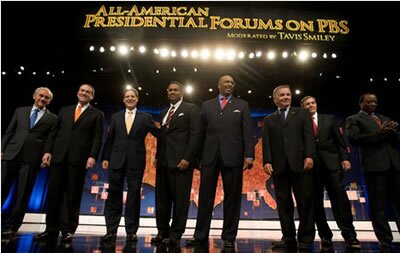 |
 |
 |
|
|
||||||||||||
|
|
||||||||||||
| Email Article | Printable Page |
Lesser-Known GOP Candidates Debate on Morgan State Campus
 |
|
John Harrington
Mike Huckabee, former Arkansas governor, left; Rep. Ron Paul, R-Texas.; Sen. Sam Brownback, R-Kan.; moderator Tavis Smiley; Michael Steele, former Maryland lieutenant governor; Rep. Tom Tancredo, R-Colo.; Rep. Duncan Hunter, R-Calif.; and former ambassador Alan Keyes at the presidential forum at Morgan State University.
|
The front-running Republican presidential candidates were absent from the PBS "All-American Presidential Forum" at Morgan State University, but two of those who did appear spoke later about making college more affordable for minority students.
“Having work available for college students I think is an important thing," Rep. Duncan Hunter, R-Calif., said afterward in response to a question. "Maybe we can develop enterprise zones in college areas where small businesses would be able to hire college students.”
Mike Huckabee, former governor of Arkansas, said, “A K-12 education was [a] fundamental right. A K-12 education is not preparation enough for the workforce. We’re going to have to start having a serious discussion if we’ve not gotten to the place where we make sure that everybody can have at least a K-14 education.”
They did not elaborate.
Talk-show host Tavis Smiley, who produced the event, left empty lecterns to represent the four absent candidates during the Sept. 27 forum. Missing were former New York mayor Rudolph Giuliani, Sen. John McCain of Arizona, former Massachusetts governor Mitt Romney and former senator Fred Thompson of Tennessee. They cited scheduling conflicts, but the candidates who attended said there was no reason not to be there.
“If you’re going to be the nominee, you need to show that you can reach out and win votes beyond your own party,” Huckabee told reporters. “You don’t win minority votes by waiting until October of election year and making a brief sashaying over into the neighborhood and saying, 'by the way I’ve [been] with you all along.'”
Hunter said, “I just thought about the opportunity that I had. The fewer guys who show up, the more time I get in the debate.”
Also present at the first GOP debate ever hosted at a historically black college or university were Sen. Sam Brownback of Kansas, former ambassador Alan Keyes and Reps. Ron Paul of Texas and Tom Tancredo of Colorado.
The debate came in a week of observances of the 50th anniversary of the deployment of federal troops to integrate Central High School in Little Rock, Ark., and the release of Mychal Bell, one of "Jena 6," black students who many say were accused too harshly in the beating of a white student. He was released on $45,000 bail on the day of the debate.
The candidates were asked about the fairness of the criminal justice system. Paul said, “A system designed to protect individual liberty will have no punishments for any group and no privileges. Today, I think inner-city folks and minorities are punished unfairly in the war on drugs. . . . We need to repeal the whole war on drugs.”
Huckabee said, "if we actually had justice under the law I think it would be a big improvement. If we had a repeal on most of the federal laws on drugs and the unfairness of how blacks are treated with these drug laws, it would be a tremendous improvement."
Discussing illegal immigration, all the candidates expressed a desire to increase border control and to minimize the number of illegal immigrants.
Brownback, who has been an advocate for building a fence across most of the southern border, said, “The American people are for immigration. They’re for legal immigration, not for illegal immigration.”
“If people want to come into America, they have to knock on the front door,” Hunter said.
Posted Oct. 1, 2007
In News
Sonic Boom Silenced: Hazing Complaints Investigated
HBCUs Figure in Obama's Campaign Strategy
2 Delaware State Students Shot on Campus
| Home | News | Sports | Culture | Voices | Images | Projects | About Us Copyright © 2007 Black College Wire. Black College Wire is a project of the Black College Communication Association and has partnerships with The National Association of Black Journalists and the Robert C. Maynard Institute for Journalism Education. |